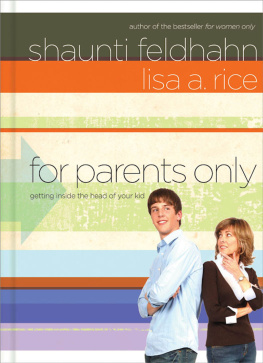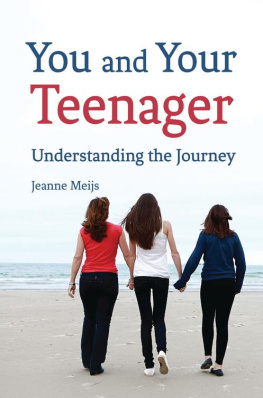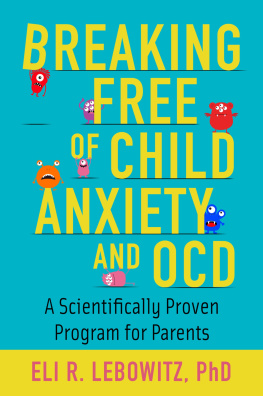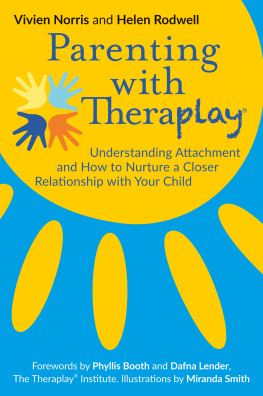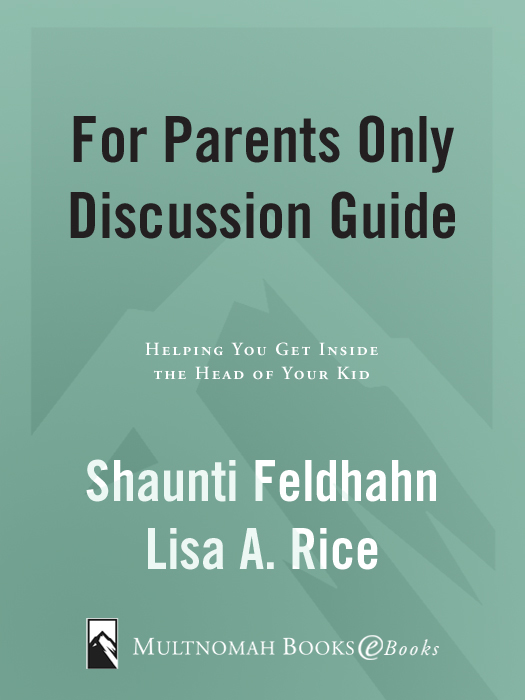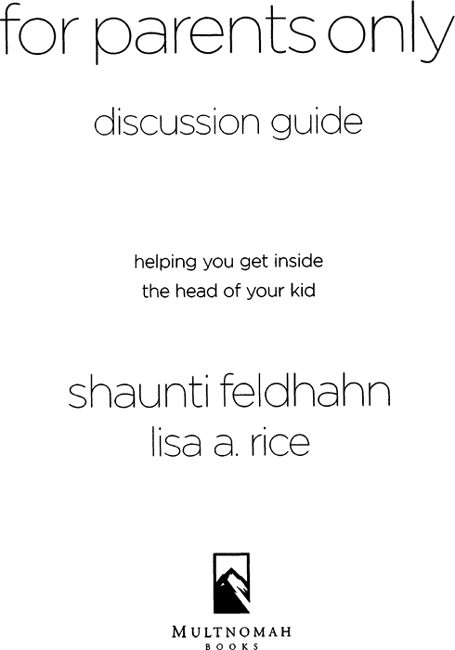Contents
1 Looking In on Growing Up
Taking a tour inside your kids head and heart
2 Rebel with a Cause
Why even good kids go crazy for freedom,
and how to restore sanity
3 Who Are You?
Why your child suddenly treats you like an alienand
acts like one too
4 The Good Thing About Being the Bad Guy
Why your child secretly hopes youllstand your ground
5 I Will Be Here for You
How to help teens feel secure in the ascent to
adulthood, even when they lose their footing
6 Can You Hear Me Now?
Why your teen is convinced he cant talk to you,
and how to change his mind
7 Attitude Adjustment
What mood swings reveal about teens secret fears,
and how you can boost their confidence
8 In Case You Ever Wonder
What your child most wants to tell you
One
LOOKING IN
ON GROWING UP
Taking a tour inside your
kids head and heart
I f your experience is anything like ours, we imagine youve found parenting to be a dizzying combination of joy, frustration, amazement, confusion, delight, and anxietysometimes all within a single hour. Its both exciting and sobering to watch as those little fat babies who coo and smile delightedly at us transform into long-legged teenagers who shake their heads over our complete lack of coolness.
It feels like one day were pushing them on the swings and the next were pushing them into college. And that seeming nanosecond of time between the two is, obviously, the most formative period of our childrens lives. As we help our kids navigate these foundational years, most of us realize we need a little guidance ourselves.
As we embarked on several research projects to help people understand those closest to them, the two of us realized that unraveling the mystery of whats going on inside our sons and daughters was one of the most important things we could ever do. So after a year of intensive research, focus groups, and surveys of kids and teens across the country, we revealed our findings in the book For Parents Only.
Understanding Our Kids
Theres an ancient Hebrew proverb that says, Happy the generation where the great listen to the small, for it follows that in such a generation the small will listen to the great. It is for this reason were relaying to you what our children are privately thinking and feeling, even though we certainly do not endorse all of it. But we believe listening to these heart cries is a critical step in building the relationship that will allow your kids to listen to you and your guidance for years to come.
The chart below offers a summary of the six key insights we uncovered about the inner lives of kidsthe things they say too many parents just dont get. The left column outlines what we often assume about our kids based on their behavior when they hit the tween and teen years, while the right column reveals the surprises about whats really going inside their minds and hearts.
When They Hit the Teen Years |
|---|
Heres What We Think Is Happening | Heres Whats Really Happening |
|---|
Peer pressure pushes kids to rebel and behave in reckless ways without thinking through the consequences. | The intoxicating nature of freedomand the fear of losing itcan lead even good kids to make choices that look like recklessness and rebellion, but directly addressing their craving for independence will help them build responsibility. |
Teens seem to reject parents and their values, no longer caring much what their parents think. | Separating themselves from their parents identity is one of the only ways healthy teenagers can develop their own; but even as they seem to push us away, our children still secretly want to know our values and need our affirmation of who they are becoming. |
Teens dont want rules or discipline | Although our teens test our authority and argue with rules, they secretly want us to stand firm as parents and will lose respect for us if we dont |
When kids make mistakes, they disregard their parents opinions or criticism. | Although they may not look like it, kids want the security of knowing we are making the effort to understand them and will be there for them regardless of their mistakesbut kids will emotionally shut out a parent they see as judgmental. |
Kids say parents dont listen. | Kids tend to stop talking because they perceive parents as rotten listeners but will open up when we prove were safe and calmly acknowledge their feelings before addressing a problem. |
Teens give in easily to negative attitudesafflicting their families with sullenness, anger, or back talkover what seem to be minor issues. | What looks like an attitude problem may actually be a sign of insecurity, but actively countering our childrens fears can build their confidence and help them become more respectful of parents and others. |
As we travel and speak to various groups about these and other findings, we frequently hear, How can I apply these truths to my life, with my kids?
This discussion guide will help you do just that. Its designed to be used in two different ways: (1) as a catalyst for group discussion and life application with other parents, and (2) as a helpful road map for initiating some eye-opening conversations with your child.
Each chapter in this guide corresponds to a chapter subject in the main book:
For consistency and ease of use, each chapter follows the same format, opening with tools for group discussion and personal reflection, then highlighting practical ways to test and apply your insights in your daily interaction with your child.
Each chapter has basically the same layout. Among other features youll find:
a Recap of key insights from the book
Key Questions for discussion and/or personal reflection
Life Story case studies with follow-up questions for practice in getting inside your kids head (in other words, learning the skill of reading their minds)
a Kid Perspective and a Parent Responsea new quote that reflects what a real-life teen is thinking about the topic at hand, and an opportunity for you to respond to that input
Weekly Challengesaction items to help you practice your new insights during the week
And also
Because every discussion group has its own character and goals, and each individual parent has different primary concerns, this guide is designed to be flexible. You can use it over any number of weeks, mixing and matching the different elements in whatever way best suits your needs.
For example, your group may opt to cover only a single subject over one or two sessions, trying to hit as many of the different features as time allows. Alternatively, you may want to combine chapters and only tackle the Key Questions in each. Your group may even want to skip most of the Key Questions and focus your time on the case studies and Weekly Challenges. We encourage you to pick and choose the combination that works best for you.




